
views
- Explain to your children that nudity is not about sexuality but that it is a natural state. Avoid expressing your sexuality around your kids.
- Model positive body image in front of your kids, and help them create personal boundaries so they know that whether they’re naked or not, they’re in charge of their bodies.
- Answer questions your kids might have about nudity and sex without judgment so that they know there’s nothing shameful about being naked.
- Educate your children on different cultural views on nudity, and let them know their friends may not agree with or understand your family’s nudity, and that’s OK.
Teaching Kids about Nudity
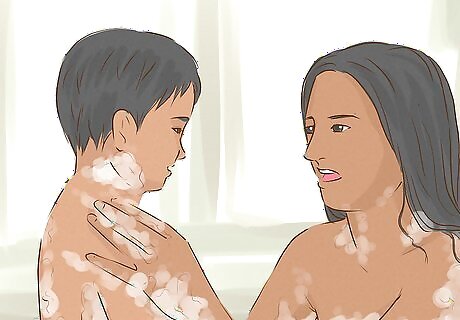
Explain to your children that nudity is natural and not about sex. Depending on the culture where you grew up, you might think of nudity as being sexual. However, it’s also your most natural state. When you’re nude around your kids, act like it’s a natural, normal thing. Encourage them to embrace nudity as an unremarkable part of being human rather than a sexual act. Being nude doesn’t have to trigger sexual attraction. Keep sex and nudity separate in your family so that nudity is practiced in a healthy way. It’s best to introduce family nudity when your children are young. If you have older children, it may be best to practice nudity when they’re not around unless they’re comfortable with it.

Let your kids know there are different cultural norms regarding nudity. Every culture has their own values when it comes to nudity. For instance, European cultures are more open about family and public nudity, while other cultures are more modest. There’s nothing wrong with having different cultural values or with questioning the values of where you live. However, talk to your children so they know what’s different about how they live versus what their friends might think. You might say, “In our family, we like to be close to nature and we celebrate our bodies. That means we’re okay with being naked around our family members. Some of your friends might think that’s not okay because they have different family values.”
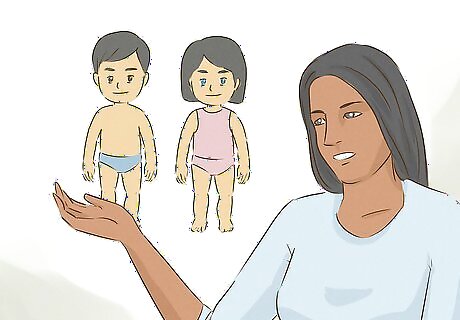
Introduce other-gender nudity when your children are young. One of the biggest challenges with family nudity is dealing with the difference between the genders. Children will likely have a lot of questions, and some people may be uncomfortable with your decision. Introduce your children to safe other-gender nudity from birth or as early as possible. Teach them about the differences between your bodies and what behaviors are safe and appropriate. Answer any questions that your child has about the differences between each family member’s body, such as genitalia and body hair. You might say, "I have more hair than you do because I'm a grown up. One day you'll have hair, too," or "You have a penis and your sister has a vagina, so you look different down there." Explain what’s okay and what’s not when it comes to touching. You might say, "It's not okay for anyone to touch you in a way that makes you feel uncomfortable. Also, no one should touch you down there until you’re grown.”
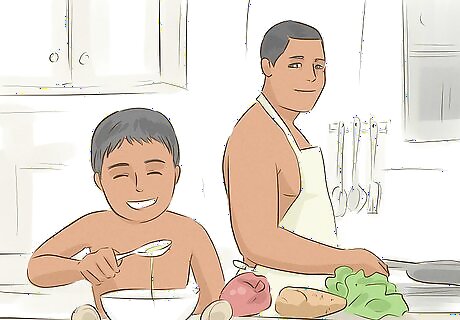
Model healthy body image while being naked. One of the biggest benefits of practicing family nudity is building a healthy body image for your children. While you’re naked around them, act like you’re comfortable and proud of your body. Additionally, avoid criticizing your body when you’re around your kids. Instead of saying something like, “I wish I could get rid of this belly,” say something like, “I’m glad that my body could bring you into the world.”
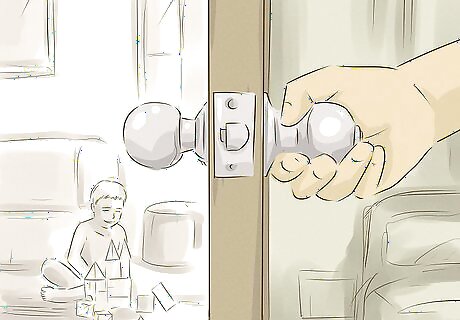
Avoid expressing your sexuality when you’re in a family setting. While your sexuality is normal and healthy, it’s something you should only show when you're in private. Otherwise, your children may get confused about what’s okay and what’s not. If you get aroused, cover up or excuse yourself to another room. Similarly, don’t engage in sexual touching with your partner when your kids are around. For instance, don’t squeeze your partner’s breasts or touch their genitals when your kids are looking. This will make them think that they should do these things because you’re modeling the behavior. There's nothing wrong with children seeing their parents naked if it's not in a sexual way and if the child is comfortable.
Setting Boundaries and Rules
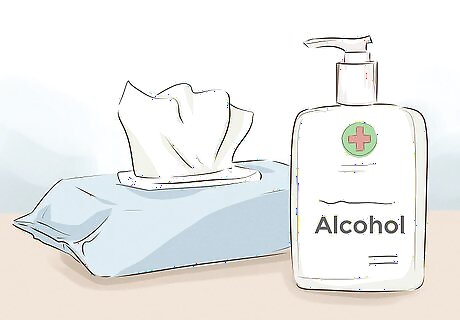
Be clean and hygienic when spending time in the nude. When you’re nude, you need to pay more attention to your family’s hygiene. Your family may accidentally transfer fecal matter, vaginal discharge, or menstrual fluids onto your furniture or flooring. Make sure your family bathes often and that each family member cleans themselves well after using the restroom. Additionally, consider sitting on a towel when you’re on the furniture. Using moist wipes after you use the restroom may help you get your genital and anal area cleaner.

Let each family member decide what feels comfortable to them. You likely want to practice nudity as a family because you think it provides benefits. However, it’s possible that your family members won’t feel the same way. Allow your partner, kids, and other household members to decide what makes them comfortable. Then, work together as a family to honor each other’s needs. For instance, your partner may be okay with wearing underwear but not being fully nude. Similarly, your kids might decide they feel comfortable around same-sex family members only.
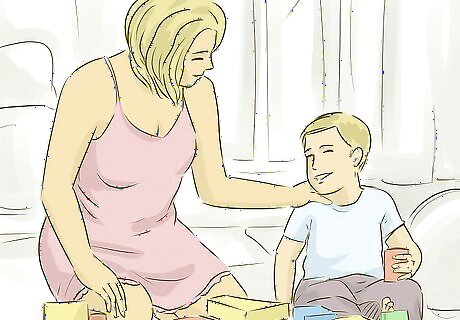
Respect boundaries that other family members set regarding nudity. After you decide what each person is comfortable with, discuss the boundaries that you want to set as a family. Then, revisit these boundaries as your children grow up to make sure they reflect their current feelings. For instance, if your child says they don’t want you to be nude around them, wear clothing when you’re spending time with them. Similarly, your child may not want to take a bath or shower with other family members, and that’s okay.

Set rules for when being naked is okay and appropriate. While there’s nothing wrong with nudity, it’s not appropriate for every situation. It might be easy for adults in the family to recognize when clothing is necessary, but children may have difficulty knowing when and where it’s okay to be nude. Talk to your child about the importance of wearing clothes in public spaces and help them set rules. Here are some rules you might consider: You can be nude at home and in secluded locations. Clothing must be worn around guests. Clothing must be worn at school or work. Clothing must be worn in all public spaces.
Addressing Potential Issues

Talk about physical differences in a positive, educational way. Your children are going to notice the differences between bodies. This can include different sexual organs, different amounts of body hair, and body fat. Answer any questions that they have about each family member’s body. Keep your attitude positive and try to help them learn more about the human body. For instance, they might say something like, “Why don’t you have a penis?” You might respond, “Some people are born with a penis, while other people are born with a vagina.” They might also say something like, “Why is your tummy squishy?” You might say, “Some people have a squishy tummy, and some people have a hard tummy. Both can be beautiful.”

Help your children learn to respond to questions about nudity. While nudity may be the right choice for your family, some people are going to be confused about it. This means your children will start to get questions about it as they get older. Talk to your kids about how they should respond to these questions. This will help them explain your values in a way that other people understand. For instance, your child’s friend may ask them, “Isn’t it wrong to be naked around your parents?” Your child might respond, “In our family, we see nudity as being natural, so it’s not weird for us. We don’t even notice that we’re naked.”

Calmly discuss appropriate sexual behavior with your child. It’s totally normal for young children to explore their bodies, so don’t worry if your child starts to touch themselves. However, it’s important that you discuss what’s okay and what’s not. Calmly and respectfully tell your child that it’s not okay to touch themselves sexually in front of others. Additionally, explain that they shouldn’t touch other people in a sexual manner. You might say, “I saw you tugging on your penis earlier. It’s okay to want to touch yourself, but you can only do that when you’re by yourself.” Don’t get upset or judgmental because it may make your child think that sexuality is wrong. It’s best to take your child to see a doctor if they’re continuously displaying sexual behaviors. While it’s normal for children to explore their bodies, sometimes kids engage in sexual behaviors because they’ve been exposed to inappropriate sexual situations.
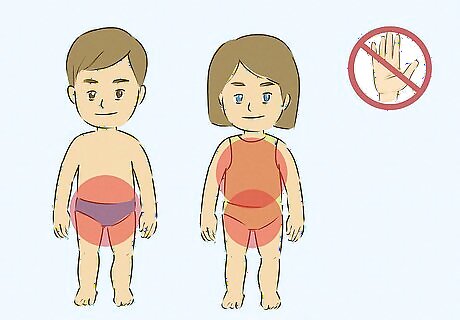
Teach your child about appropriate and inappropriate touching. Nudity teaches kids to be comfortable about their bodies, which is great! However, they also need to learn that it’s not okay for other adults or children to touch their private parts. Teach your children the names of their body parts. Then, explain that it’s not okay for people to touch them and that they need to tell you immediately if it happens. You might say, “Your body belongs to you, so it’s not okay for someone to touch you there. If someone ever touches you there, talk to me immediately so I can make sure you’re safe.” You may explain that sometimes you or a doctor will touch them in their private area for medical purposes. However, explain that this type of touching should never be secretive. Say, “Sometimes it’s okay for a parent or doctor to touch you there. If this happens, don’t be afraid to tell me or another trusted adult what happened. Good touching is never a secret.”

Don’t ever show your child pornographic material. While it’s okay to practice nudity as a family, that doesn’t mean your child should see other people naked, especially in a sexual context. Don’t under any circumstances show your child pornographic images. This can confuse them about what is natural and what isn’t, which might make them explore inappropriate sexual behaviors before they’re ready. Keep any pornographic images in a safe, hidden location if you have them. For instance, seeing posed pornographic photos may make it hard for your child to separate family nudity from sexual nudity. It's also important to understand the difference between pornographic or lewd nudity and artistic nudity as well. For example, anything pornographic is not OK to show to children as it will be confusing to them. However, nude paintings or sculptures at art museums are OK to show to children ( only if they're ok with it though) as these things are not pornographic.




















Comments
0 comment